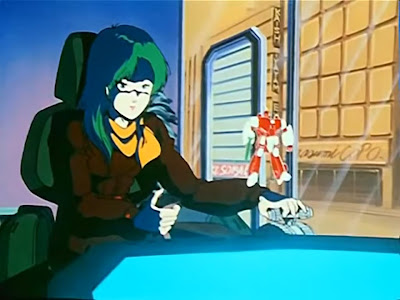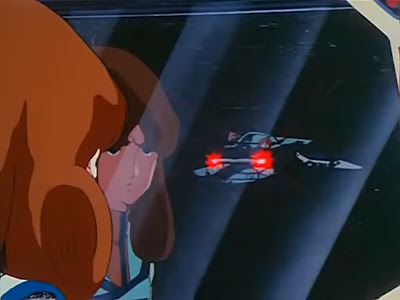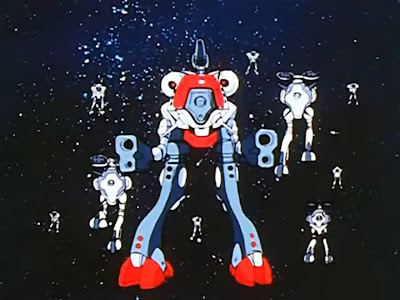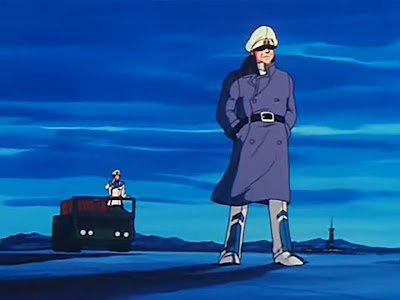 |
| Milia challenges her nemesis, Max, to a not-so-friendly game... |
Super Dimension Fortress Macross: Goodbye Girl
Original Air Date - Macross: Apr. 3, 1983.
Written by: Sukehiro Tomita. Directed by: Noboru Ishiguro, Fumihiko Takayama.
Robotech: Showdown
Original Air Date - Robotech: Apr. 4, 1985.
Story Editor: Steve Kramer. Supervising Director: Robert V. Barron.
PLOT - MACROSS:
The Macross's scientists have determined that the Zentradi are biologically identical to humans. Armed with this information, Misa takes a shuttle back to Earth, determined to persuade the government to open peace talks with the enemy. Kamujin, however, has laid a trap to intercept her shuttle, using a decoy squadron to draw away her escort.
Meanwhile, Milia finally tracks down the human pilot who bested her: Max. At a video arcade, sharing a flight simulator/combat game, they stage a rematch, with Max none the wiser that this beautiful woman is actually his mortal enemy!
PLOT - ROBOTECH:
The SDF-1's scientists have determined that the Zentraedi are biologically identical to humans. Armed with this information, Lisa takes a shuttle back to Earth, determined to persuade the government to open peace talks with the enemy. Khyron, however, has laid a trap to intercept her shuttle, attempting to use superior numbers to bludgeon her escort into submission.
Meanwhile, Miriya finally tracks down the human pilot who bested her: Max. At a video arcade, sharing a flight simulator/combat game, they stage a rematch, with Max none the wiser that this beautiful woman is actually his mortal enemy!
 |
| Hikaru signals his farewell to Misa. |
CHARACTERS:
Since Robotech has moved the Rick/Lisa relationship considerably more forward than Macross has with Hikaru and Misa, their interactions play out differently between the two versions. Hikaru and Misa have evolved into a comfortable friendship, but Hikaru doesn't seem to even consider that there could be more than that. Robotech has pushed Rick/Lisa much harder than the source show, so Rick reacts more personally both when he learns that Lisa's returning to Earth and when he says goodbye to her. Neither take is better than the other, at least not with regard to this episode, but it is a notable difference.
By contrast, the encounter between Max and Milia/Miriya plays out much the same in both versions. Max is entranced with this strange beauty, whom he first glimpsed at the screening of Shao Pai Long, and he considers their arcade match to be a friendly way of flirting and catching her attention. As soon as she realizes that he's the pilot she's been seeking, she battles him just as earnestly in the video game as when she fought him in actual combat. Both are intensely competitive, and their personalities and some well-done animation makes their confrontation one of the best scenes in an episode that has several good moments.
There's also a decent subplot for Shammy/Sami, who is usually relegated to comedy relief. That's partially true this time, as well, given that her strand revolves around an error in judgment. But it's clear that she's much more competent in charge of the bridge here than she was in Micro Cosmos. She's able to adjust for her mistake, and she even learns from it. Meaning that even a minor comedy character gets some actual development here.
Advantage: None.
NARRATION:
Robotech aired with a younger, after school audience in mind, and the scripts often betray a lack of trust in that audience to keep up with the story. While the narration here isn't as intrusive as in some episodes, I noticed the narrator talking over many transitions that Macross allowed to just play out on their own.
Robotech also adds internal monologues. I actually like one of these, when Miriya sits down at the arcade's battle simulator thinking that she's discovered how the "Micronians" train their youth for combat. It's a well-judged bit that effectively takes a human leisure activity and gives it new context from the viewpoint of someone from a fully militarized culture.
Other examples are mostly just intrusive, sometimes more than the actual narration is. I particularly groaned at the "my little girl is safe" inner monologues given to Lisa's father. Macross trusts us to understand his relief at his daughter's safe return. Robotech feels the need to tell us.
Advantage: Macross.
 |
| Macross's Kamujin has a cunning plan to intercept Misa; Robotech's Khyron just plans to overwhelm the humans. |
CUTS AND ALTERATIONS:
Misa's Call: Before leaving, Misa calls Hikaru to let him know that she's leaving. She tells him that she had to keep her departure a secret to head off potential civilian unrest about a military officer returning home when they cannot. In Robotech, this is changed, with Lisa instead telling Rick that they don't want to raise civilian hopes - not for the first time, sanding off the edges of the original series.
Kamujin's Strategy vs. Khyron's Bludgeoning: Macross's Kamujin uses a diversionary force to pull some of Misa's escort away before attacking. Robotech trims this out (hey, it's a third of a commercial), and has Khyron just attacks, with no strategy beyond overpowering the humans with numbers. I would be irritated about this, except that it's entirely consistent with the way Khyron has been characterized. Where Kamujin is sly, Khyron is basically a hammer in search of nails. Even so, I find the Macross version of this scene more interesting.
The Code Book: In both versions, Shammy/Sami makes the mistake of not giving Hikaru/Rick the updated codes for the day, thinking that he won't need them since he's off duty. This comes back to haunt her when he's called in. In Macross, a post-battle moment has Capt. Global deciding not to reprimand Shammy, feeling that it was a valuable lesson for her to learn. Robotech just cuts away while Claudia is teasing Sami for her error, with an official reprimand not even mentioned as a possibility.
Saying Goodbye: Because Robotech has pushed the Rick/Lisa relationship further than the Hikaru/Misa friendship in Macross, their goodbye scene takes on a different tone. Hikaru tells Misa that he considers her an excellent controller despite his complaint, and signals his hope that she completes her mission and returns to the ship. Rick's goodbye is much more personal, with him signaling, "I believe in you." It's an excellent scene in both versions, and each variant is entirely appropriate to its given series.
Max and Milia: In Macross, Max checks out Milia during their game, making note of her measurements. This is removed in Robotech, and it frankly isn't missed. At the end of the game, Macross's Max credits her as a difficult opponent; Robotech's Max blows off the match, saying "it wasn't too tough," which has the effect of widening the gap in skill level between the two while also making him a bit arrogant.
A Much Shorter Ending Conversation: The episode ends with Claudia approaching a brooding Hikaru and gently trying to fan his interest in Misa over Minmay. The Macross version is longer and plays out like an actual conversation. The Robotech version has been trimmed back noticeably, with Claudia now delivering more of a rushed monologue.
Advantage: Macross.
INCIDENTAL MUSIC:
Robotech wins out here mainly because of the arcade showdown between Max and Miriya. I've often found the Robotech theme distracting when it pops up in-episode, but here it works quite well, lifting an already good scene up an extra notch.
Advantage: Robotech.
 |
| Misa's father waits anxiously for her return. |
OVERALL ADVANTAGE: NONE:
Most of Robotech's changes this time are slight. In at least a couple of cases, those changes are appropriately tailored to shifts the series has made to the original relationships and characters. I think the ending conversation works much better in Macross than its abridged Robotech form... but that's made up for by the music making the Max/Miriya confrontation that little bit more memorable in Robotech. In this case, I don't think that either version of the episode ends up with a particular advantage over the other, and both versions are quite good.
OTHER MUSINGS:
This episode packs its 25 minutes with a series of terrific scenes: The Hikaru/Misa goodbye with the signal lights; the arcade confrontation between Max and Milia; and (in Macross, at least) the ending conversation between Hikaru and Claudia.
I also quite liked the argument between Misa and her father. He argues that any negotiation must be from a position of strength, and he actually makes a good case for his position. As a viewer, I appreciate that he's shown intelligently supporting his decision. He's wrong, of course - but not because he's an idiot, but because he's underestimating the size and power of the enemy fleet. So many "serious adult" shows should learn this lesson: a character can be in the wrong without being a useless imbecile!
With its strong character work and multiple memorable moments, the script in both versions takes what might have been a mere "setup episode" and makes it into a minor series highlight.
Overall Rating: 9/10.
Previous Episode: Drop Out/Reckless
Next Episode: Virgin Road/Wedding Bells
Review Index
To receive new review updates, follow me:
On BlueSky:
On Threads:


No comments:
Post a Comment